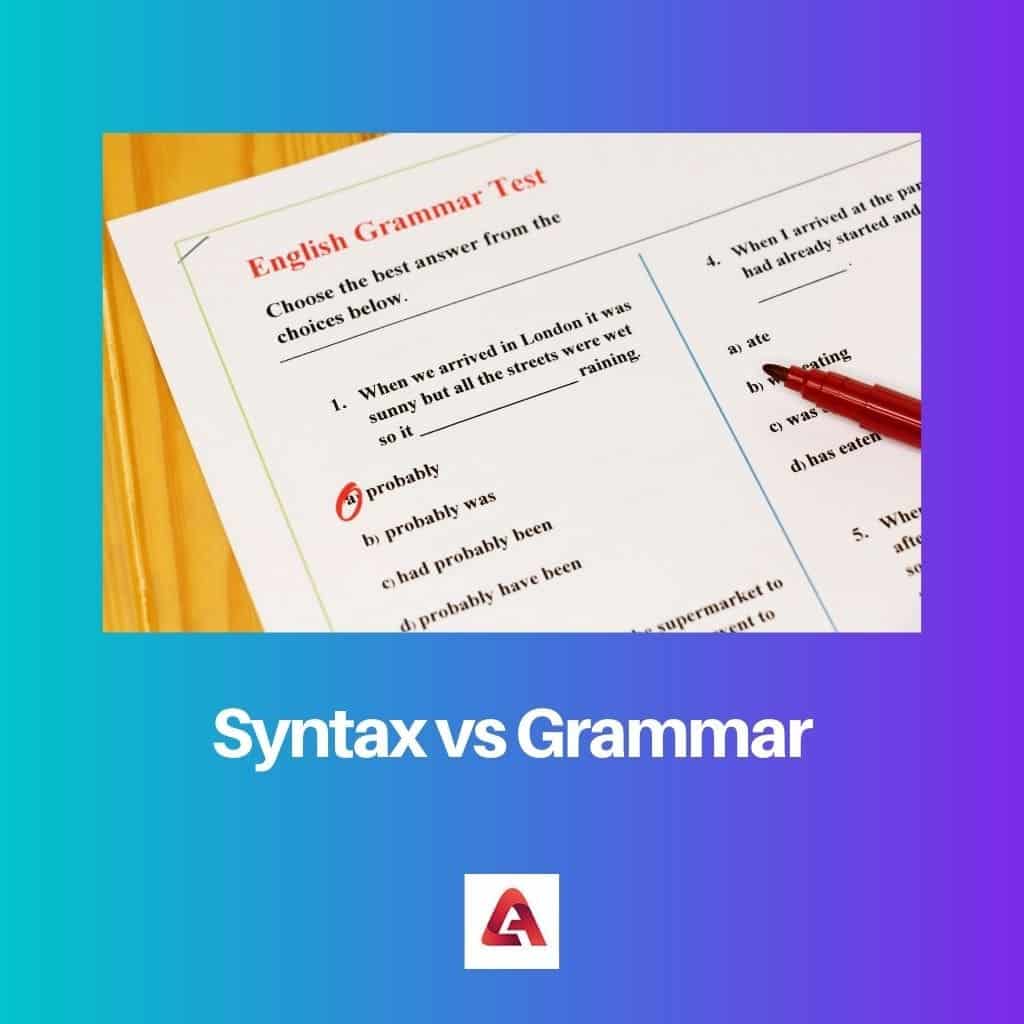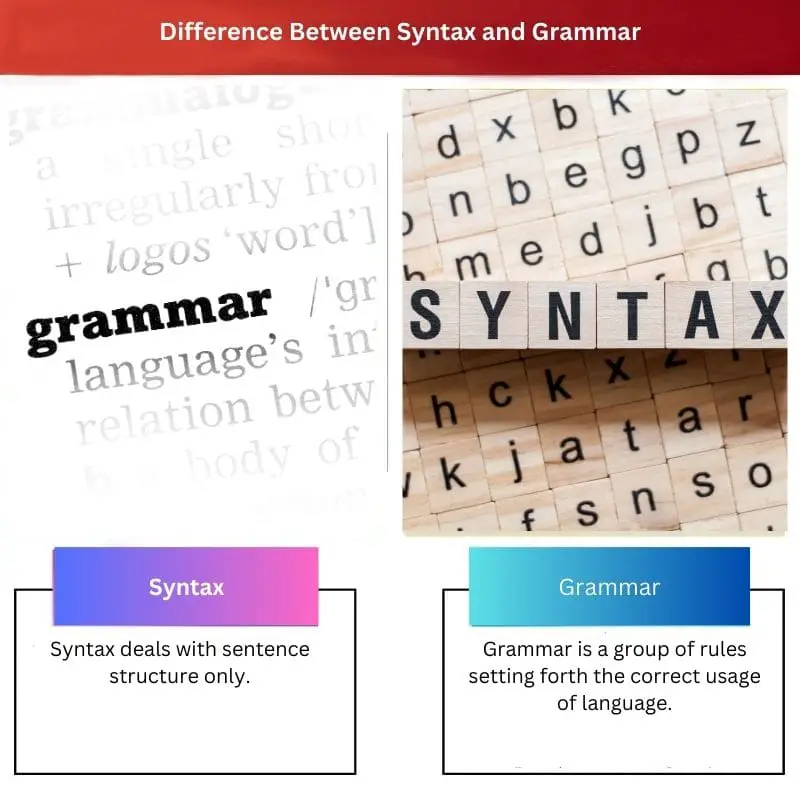Languages are fun to learn. However, only those who understand the Grammar and Syntax can quickly write and speak any language correctly.
Key Takeaways
- The syntax is the set of rules governing sentence structure and the arrangement of words, while grammar encompasses syntax and additional linguistic rules.
- Syntax focuses on word order and the relationships between words, while grammar includes aspects like spelling, punctuation, and morphology.
- Syntax errors result in sentences that are difficult to understand, while grammar errors can lead to clarity and interpretation.
Syntax vs Grammar
The difference between Syntax and Grammar is that Syntax is a part of Grammar that deals with putting together words in the proper sense. In contrast, Grammar is a set of rules that defines the grammatical structure of a language.

However, the above is not the only difference. A comparison between both the terms on specific parameters can shed light on subtle aspects:
Comparison Table
| Parameter of Comparison | Syntax | Grammar |
|---|---|---|
| Meaning | Syntax deals with sentence structure only. | Grammar is a group of rules setting forth the correct usage of language. |
| Scope | The syntax is about the order of the words. The syntax does not include Grammar. Hence it can be considered as having a limited scope. | Grammar includes Syntax and hence can be considered as having a broad scope. |
| Subsets | The syntax does not have any further diversification | Grammar is further diversified into two types, viz. Morphology and Syntax |
| Level of Operation | Syntax operates at a micro level; that is, Syntax is all about word structuring or determining which word comes before and after another word. | Grammar operates at a macro level; that is, Grammar is all about the correct structure of the overall language and not just focusing on words and sentences. |
| Composition | The syntax has a free and easy nature or, in other words, can be considered optional. The syntax does not tell anyone how to use or lay down rules. | Grammar is more authoritarian. It lays down specific rules to be followed regarding the grammatical structure of language. |
| Applicability | Most people may not be aware of Syntax structures. Syntax is more of a more profound study which may be known to literature or language scholars. | Most people will be aware of Grammar and the rules related to it. Grammar is something that is followed in daily use. |
| Order of Precedence | The syntax is learned after studying Grammar | Grammar is learned first before checking Syntax |
What is Syntax?
The syntax is derived from the French term “sintaxe. Syntax, in simple meaning, means arranging together. From a language perspective, Syntax can be considered an arrangement of words.
The syntax is a part of Grammar. The syntax is how linguistic elements (such as words) are combined to form constituents (phrases or clauses).
Learning Syntax is essential to create well-defined and structured sentences intended to convey the correct meaning and perspective of the speaker or writer. The syntax is a linguistic discipline which studies the structure of a sentence.
The syntax is a subset of Grammar. In this sense, Syntax operates at a micro-level to understand and study a particular set of rules and principles for the formation of organized sentences.

What is Grammar?
Grammar means a group of rules or procedures that dictate how a language should be used (written/spoken) correctly.
Grammar is further subdivided into two categories. One is known as morphology, and the other is known as Syntax. Morphology is to do with the internal structure of words.
Grammar has macro scope because it lays down the foundation and general rules for constructing sentences and words.
Grammar is a set of structural rules which dictates how to construct sentences, words, and phrases in a language. Grammar can be regarded as putting forth a particular position or proposition.

Main Differences Between Syntax and Grammar
- The syntax is not so familiar in daily usage. Grammar plays an essential part in daily use.
- The syntax is optional. Grammar has a prescriptive approach.


The detailed comparison enhances understanding, I thoroughly enjoyed reading the article.
Learning about the intricate nature of syntax and grammar was both educational and amusing.
The syntax and grammar differences are very insightful. This article presented it comprehensively.
This is a very interesting article. I have a better understanding now of what grammar and syntax mean.
Excellent insight into language structures. The article was an enriching read.
This article provides a significant understanding of syntax and grammar, breaking down their differences effectively.
The distinction between syntax and grammar was explained in an engaging manner, great read.
The analysis of syntax and grammar differences were presented clearly and helped me understand their unique roles.
Impressive explanation of syntax and grammar differences, it’s intellectually stimulating.
This is highly informative, thank you for sharing.
I find the detailed comparison between syntax and grammar quite enlightening.
The comparison between syntax and grammar is fascinating, especially understanding the scope and applicability.
I find it amusing that the syntax is optional, while grammar has a highly prescriptive approach.
It’s fascinating to see the contrast and comparison between syntax and grammar, both play a crucial role in language.
The article provided a detailed understanding of the complexities involved in syntax and grammar.
The article brought an element of humor to the topic, making it an enjoyable learning experience.
It’s always interesting to learn about the fundamental rules defining the grammatical structure.
This article explains the intricate differences between syntax and grammar very well. It’s quite informative.
The comprehensive breakdown is thought-provoking. Thank you for this.
The intricate differences highlighted are indeed intriguing.
The educational value of this article is immense, thank you for the insight.
I appreciate the depth of information in this article, it adds clarity to the topic.